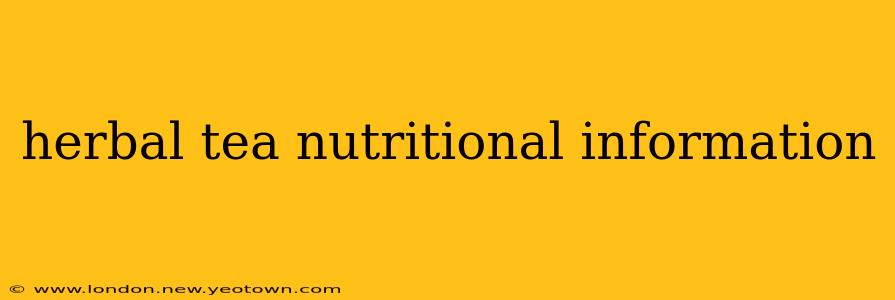Herbal teas, the fragrant and flavorful brews crafted from various plants, have captivated people for centuries. But beyond their comforting warmth and delicious taste, what’s the nutritional story behind these beloved beverages? Let's embark on a journey to uncover the nutritional information of herbal teas and explore their potential health benefits. Unlike traditional teas like black or green tea, which derive from the Camellia sinensis plant and contain caffeine, herbal teas boast a unique nutritional profile centered around the specific herbs and plants used.
What are the Nutritional Benefits of Herbal Tea?
This is a question with a multifaceted answer, as the nutritional value of herbal tea varies greatly depending on the ingredients. While herbal teas generally aren't significant sources of calories, vitamins, or minerals in the same way that fruits and vegetables are, they offer a range of potential benefits stemming from the bioactive compounds within the plants themselves. These compounds can contribute to overall health and well-being. Think of it like this: each herbal tea is a unique blend with its own specific nutritional fingerprint.
Does Herbal Tea Contain Calories?
Generally, herbal teas are incredibly low in calories, often containing zero or negligible amounts. This makes them a guilt-free beverage choice for those watching their calorie intake. However, adding sweeteners like sugar, honey, or syrups will significantly increase the calorie count, so mindful consumption is key.
What Vitamins and Minerals are in Herbal Tea?
The vitamin and mineral content of herbal teas is highly dependent on the plants used. For example, chamomile tea might contain small amounts of antioxidants and flavonoids, while hibiscus tea can be a source of Vitamin C. However, relying solely on herbal tea for your daily vitamin and mineral intake isn't recommended. A balanced diet rich in fruits, vegetables, and other whole foods remains crucial for optimal nutrient intake.
Is Herbal Tea Good for Weight Loss?
Some herbal teas, particularly those with metabolism-boosting properties (like ginger or green tea, although technically not a herbal tea), are often associated with weight loss efforts. However, it's crucial to remember that herbal tea alone is not a magic bullet for weight loss. A healthy diet and regular exercise are the cornerstones of any successful weight loss plan. Herbal teas might play a supporting role by potentially boosting metabolism or aiding digestion, but they are not a replacement for a holistic approach to weight management.
What are the potential health benefits of different herbal teas?
Different herbal teas offer various potential health benefits, again, depending on the plants used. Here are a few examples:
- Chamomile: Known for its calming properties, often used to promote relaxation and sleep.
- Ginger: May help soothe digestive upset and reduce nausea.
- Peppermint: Can aid digestion and relieve symptoms of indigestion.
- Hibiscus: Rich in antioxidants and may help lower blood pressure.
- Rooibos: Contains antioxidants and may offer anti-inflammatory benefits.
It's important to note that while many anecdotal accounts and some studies suggest potential health benefits, more research is often needed to confirm these effects definitively.
Are there any side effects to drinking herbal tea?
While generally safe, herbal teas can have potential side effects, especially if consumed in large quantities or if you have pre-existing health conditions. Some individuals might experience allergic reactions to certain herbs. Always check with your doctor or healthcare provider before incorporating herbal teas into your diet, particularly if you are pregnant, breastfeeding, have allergies, or take medications.
In conclusion, herbal teas offer a delightful and potentially beneficial addition to a healthy lifestyle. While not a primary source of vitamins and minerals, their low-calorie nature, potential health benefits (depending on the blend), and comforting properties make them a worthy addition to your daily routine. Remember to always research the specific herbs in your chosen tea and consult your doctor if you have any concerns.

